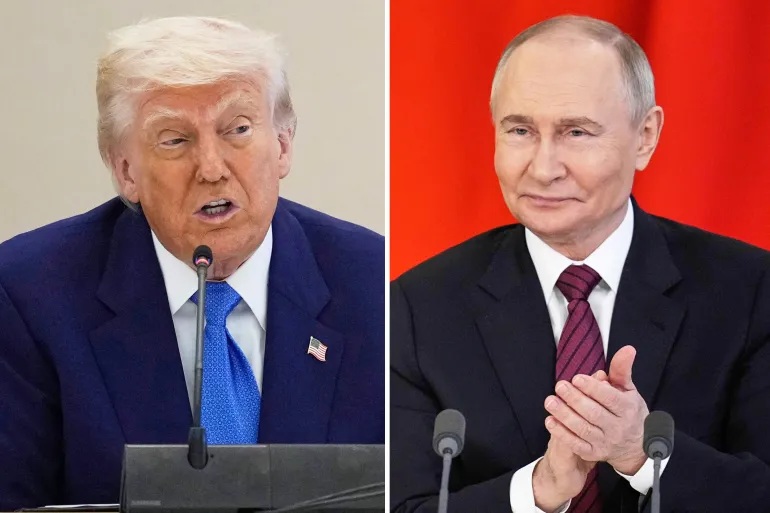Following U.S. President Donald Trump’s recent warning of imposing severe tariffs on Russia unless it ends its war in Ukraine within 50 days, Russia responded defiantly, signaling its readiness to endure any new sanctions and questioning the rationale behind Trump’s threats.
Russian Foreign Minister Sergey Lavrov articulated Moscow’s stance during a press conference at the Shanghai Cooperation Organization’s Foreign Ministers meeting in China on Tuesday.
This underscores that Russia would manage any forthcoming sanctions and expressing puzzlement about the motivations driving Trump’s aggressive posture.
Lavrov stated, “We want to understand what the U.S. President is moved by,” reflecting a combination of bewilderment and defiance.
He further conveyed confidence in Russia’s ability to withstand economic pressures: “I have no doubt we will cope with new sanctions.”
This response follows Trump’s announcement the previous day of potential “secondary tariffs” reaching as high as 100% against Russia if Moscow does not agree to a peace deal ending the Ukraine war within the stipulated timeframe.
Trump had made these remarks in a Monday meeting with NATO Secretary-General Mark Rutte at the White House, emphasizing deep dissatisfaction with Russian President Vladimir Putin’s refusal to pursue peace.
He declared, “We’re going to be doing very severe tariffs if we don’t have a deal in 50 days, tariffs at about 100 percent, you’d call them secondary tariffs.”
These tariffs would not only target Russia itself but also its remaining trade partners, aiming to squeeze Moscow’s economic lifelines further.
Secondary tariffs and sanctions seek to interdict trade avenues through countries still engaging economically with Russia, such as China, India, Turkey, and Belarus, thereby tightening the economic noose.
Russia’s reaction quickly conveyed rejection and dismissal of the ultimatum’s legitimacy.
Sergei Ryabkov, Lavrov’s deputy, described the 50-day ultimatum as “unacceptable” and criticized any demand framed as an ultimatum.
This stance was echoed by Kremlin spokesperson Dmitry Peskov, who noted at a news briefing, “The latest statements from the U.S. president are very serious.
“Something in them concerns President [Vladimir] Putin personally.”
He added that Moscow would require time to carefully analyze Washington’s rhetoric, signaling both concern and caution.
Moscow’s dismissive response aligns with its established history of resilience against Western sanctions, which President Trump’s recent threats appear unlikely to alter significantly.
Russia already faces some of the most extensive sanctions globally due to a series of geopolitical crises, including its annexation of Crimea, involvement in Syria, and interference in foreign elections.
As reported by Russian officials and legislators, previous sanctions have failed to achieve their intended objectives.
It has instead prompted Russia to strengthen its economic mechanisms, diversify trade partnerships, and recalibrate its domestic economic model.
Anatoly Aksakov, a prominent Russian lawmaker, stated directly that sanctions have not yielded results but rather helped fortify Russia’s economy and national resilience.
This sentiment reflects Moscow’s confidence that it can absorb new economic pressures while continuing its military operations in Ukraine.
Indeed, some analysts suggest that Trump’s 50-day deadline could paradoxically provide Russia a temporary reprieve.
According to them, it allows Russia to continue its military offensive without the immediate consequence of harsher sanctions.
Strategically, Trump’s threat is coupled with a novel arms deal to support Ukraine’s defense.
This act circumvents direct U.S. supply by enabling NATO allies to purchase U.S.-made weaponry, such as Patriot missile systems, and then transfer them to Kyiv.
This move addresses Trump’s long-held criticisms that the U.S. bears a disproportionate financial burden in supporting Ukraine while reinforcing Kyiv’s military capabilities.
However, the timing and tone of Trump’s ultimatum have sparked debate among experts.
Some view the 50-day timeline not as a stringent pressure tool but as an inadvertently generous window for Moscow to consolidate gains.
Critics argue that sanctions threats lacking immediate enforcement risk emboldening Russian aggression rather than deterring it.
Meanwhile, Moscow’s rhetoric frames the U.S. move as theatrical and counterproductive, framing itself as willing to negotiate but on its own terms, rejecting external ultimatums.
Overall, the exchange between Trump and Russia reflects the complex, high-stakes geopolitical chess game surrounding the Ukraine conflict.
Trump’s imposition of a hard deadline backed by the threat of 100% tariffs represents an attempt to recalibrate U.S. strategy, merging economic pressure with enhanced military support to Ukraine.
Conversely, Russia’s dismissive and confident pushback signals entrenched resistance, underscoring the Kremlin’s preparedness to weather intensified sanctions while pursuing its strategic objectives.
As this tense standoff unfolds, key questions remain about the effectiveness of economic sanctions as leverage, the prospects for meaningful diplomatic resolution, and the broader impact on European and global security.
Russia’s resilience to sanctions, combined with its rejection of ultimatums and commitment to ongoing military action in Ukraine, suggests that escalating economic warfare may harden rather than soften Kremlin policy.
This is unless paired with substantive diplomatic engagement.
The coming weeks will be critical in determining whether Trump’s tariff threat alters the trajectory of the war or merely entrenches the current conflict dynamics.







